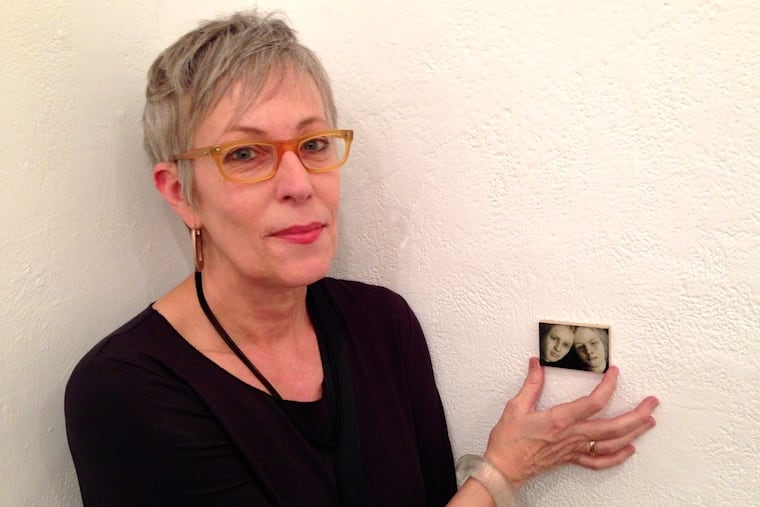Susan M. Moore, celebrated artist and longtime Temple professor, has died at 69
"Each work," she said, "seems to develop its own persona, growing out of elements of the subject and myself, no doubt, but also contributions from each viewer."

Susan M. Moore, 69, of Philadelphia, celebrated artist and longtime professor at Temple University’s Tyler School of Art and Architecture, died Thursday, Sept. 29, of respiratory failure at Thomas Jefferson University Hospital.
Creative and communicative even as a child, Professor Moore combined her singular skills as an artist and teacher to fashion an acclaimed life as a painter and a 39-year career as a popular painting and drawing instructor on Temple campuses in Philadelphia, Rome, and Elkins Park.
Well-known for her tightly cropped portraits and images of human backs, Professor Moore’s work features bold colors, light, and shadows, and often combines painting, photography, and collage. She said in her artist’s biography that she embraced “the exploration of the unique tensions that the portrait reveals about the self and the assertion of individuality in relation to the quietness of anonymity.”
Inquirer art critic Victoria Donohoe reviewed Professor Moore’s portraits at a 1989 exhibition in Philadelphia and said: “Echoes of color tonalities seem to glow from within and seep through the rough-textured ground, lending these grand-scale heads a sense of depth, spatially and psychologically.”
Professor Moore received many grants and fellowships for her work and showed in dozens of exhibitions. Her pieces reside in permanent collections at the Philadelphia Museum of Art, Pennsylvania Convention Center, National Portrait Gallery in Washington, New York Public Library, and elsewhere.
She joined the Temple faculty in 1979, left in 1981 to teach for three years at Washington University in St. Louis, and returned in 1984 to instruct at the school’s campuses in Rome, Elkins Park, and Philadelphia until her retirement in 2020. Her effusive devotion to her students led one colleague to observe that “her life as a teacher was not just a way to make a living, it was an intricate part of her life.”
Demanding in the classroom yet empathetic with the insecurities and uncertainties of youth, Professor Moore instilled confidence by challenging her students. Her deep voice and the insights she shared resonated because she was one of them, and a former student recalled in an online tribute the “strangely wonderful skeptical look she would peer into folks with.”
She helped her students find jobs, recruited them to the Rome campus, and funded scholarships by creating, organizing, and curating Tiny Biennale, a series of exhibitions and sales of miniature works no bigger than three inches at Temple University Rome. Former students called her “dedicated and hilarious,” “insightful and supportive,” and “intensely approachable” in online tributes.
She often showed up for her 8 a.m. class, one woman said, clutching a coffee and fresh from a morning yoga session. One former student said: “I looked up to her as an example for what it meant to be a strong artist, teacher, and mother all at once.”
In a tribute, Susan Cahan, dean at Tyler, said: “She stretched her students, especially sophomores, to grow in ways they didn’t expect.” Rochelle Toner, dean emerita at Tyler, said: “Susan nurtured, cajoled, cheered, challenged and celebrated the work of her students in every way.”
Born March 27, 1953, in a Navy hospital in Coco Solo, Panama, Professor Moore and her four siblings traveled with their parents, Gene and Janiece, while her father served in the Navy. She graduated from New Prairie High School in Indiana in 1971 and earned a bachelor’s degree from Indiana University Bloomington and master’s degree from the University of California, Davis. She also studied at Yale School of Art and Music.
She married cartoonist Charles Burns in 1982 and did the lettering for his comics and graphic novels. They lived in Jenkintown and the Northern Liberties neighborhood of Philadelphia, and had daughters Rachel and Ava. Social and vivacious, Professor Moore liked to host parties, inviting practically everyone she knew, and was especially eager to meet new people.
She lived in Texas, Hawaii, California, Indiana, and elsewhere before she graduated from high school, so she learned to make friends quickly and was a keen observer of people. “That factored into her uncanny ability to draw the human figure and capture the essence of the person,” her family said in a tribute.
She collected Italian ex-voto figures and Mexican masks, and was so good at squash that she beat Sen. Arlen Specter in several matches after they met one day on the court. “I love how this story shows how boss she was,” a colleague said.
“Her power,” a former student said in a tribute, “is fiercely missed.”
In addition to her husband, daughters, and father, Professor Moore is survived by a granddaughter, three sisters, one brother, and other relatives.
A celebration of her life is to be held at 2 p.m. Sunday, Nov. 13, at the Arch Street Friends Meeting House, 320 Arch St., Philadelphia, Pa. 19106.
Donations in her name may be made to the Access to Temple Rome Endowed Scholarship, Conwell Hall, 7th Floor, 1801 N. Broad St., Philadelphia, Pa. 19122.